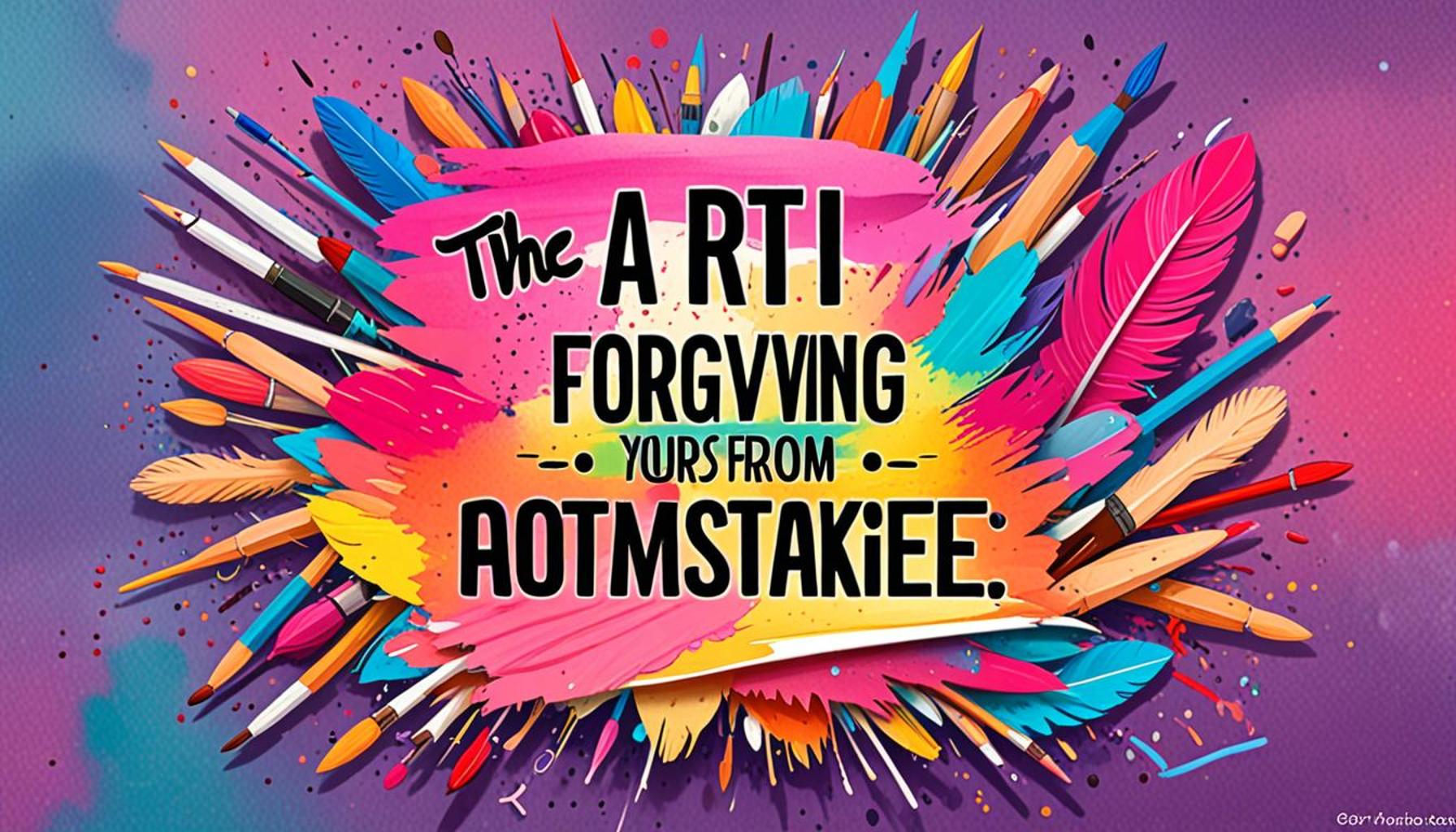The Art of Forgiving Yourself: Daily Affirmations to Free Yourself from Past Mistakes

Understanding Self-Forgiveness
Gripping the burdens of past mistakes can dominate one’s mental landscape, often leaving individuals paralyzed by feelings of guilt and shame. In many cultures, including Nigeria, where communal values and expectations play a large role in personal identity, the journey toward self-forgiveness becomes particularly intricate. It’s essential to recognize that letting go of these burdens is not simply about absolution but rather an act of reclamation—reclaiming one’s identity beyond the shadow of past actions.
The Power of Daily Affirmations
Daily affirmations are a remarkable tool in the journey toward self-forgiveness. By committing to a practice of positive self-talk, individuals can gradually reshape their mindset. These affirmations serve as reminders that everyone is deserving of kindness and understanding, not just from others but also from themselves. When regularly practiced, affirmations can:
- Boost your self-esteem: Statements like “I am worthy of love and respect” can help build confidence over time.
- Encourage self-compassion: Phrases such as “It is okay to make mistakes; I am learning and growing” reinforce a gentler view of oneself.
- Enhance your emotional resilience: Affirmations like “I am strong enough to overcome my past” can empower individuals to face challenges head-on.
In Nigeria, where community expectations often weigh heavily on one’s choices and mistakes, practicing self-forgiveness is essential for individuals to navigate societal pressures without losing their sense of self. Many Nigerians may feel ashamed of straying from family traditions or societal norms, leading to internal conflict. However, it is crucial to understand that forgiveness starts from within, and embracing this concept can ultimately liberate individuals from generational cycles of guilt.
Embracing a Better Future
Integrating affirmations into one’s daily routine can act as a catalyst for profound emotional healing. Making it a habit to begin or end each day with affirmations can significantly alter how individuals view their past. For instance, setting aside a few minutes each morning to repeat affirmations can set a positive tone for the day ahead. Likewise, at night, reinforcing self-forgiveness can provide a peaceful conclusion to daily thoughts, allowing for restful sleep.
As we continue to explore the transformative power of self-forgiveness, consider dedicating time to reflect on your journey. Look into crafting personalized affirmations that resonate with your experiences and speak to your heart. By doing so, you may discover a profound liberation from the chains of regret, enabling a confident stride towards a brighter and more fulfilling future.
YOU MAY ALSO LIKE: Read read another article
Breaking Free from the Chains of Regret
For many individuals, especially within the rich tapestry of Nigerian culture, the weight of past mistakes often feels suffocating. These feelings can manifest as a relentless echo of self-criticism and humiliation, making self-forgiveness seem like an elusive goal. However, understanding the fundamental need for self-forgiveness is crucial for emotional and psychological growth. It is not merely about condoning past actions but about acknowledging them, learning from them, and moving forward with grace.
The journey of self-forgiveness begins with the recognition that everyone makes mistakes. Even in a society that celebrates collective achievements and conformity, it is vital to appreciate personal fallibility as part of the human experience. This understanding fosters a sense of community and shared vulnerability, which can be restorative. By cultivating a mindset that views errors as stepping stones for personal development, individuals can foster resilience and authenticity in their lives.
Customizing Your Affirmative Journey
To truly embrace the concept of self-forgiveness, one must create a personalized affirmation practice that resonates on a deep level. Tailoring affirmations allows individuals to connect intimately with their emotional struggles and victories. Here are several effective affirmations to consider:
- I forgive myself for my past mistakes; they do not define my future.
- I am continually evolving and growing into a better version of myself.
- Every error I’ve made is a lesson that propels me toward positivity.
- I deserve compassion and respect from myself, just as I offer it to others.
- Today, I choose to let go of guilt and embrace hope.
Incorporating these affirmations into daily life can spark a remarkable transformation, leading to increased emotional clarity and a sense of liberation. Feelings of guilt can be replaced with a spirit of compassion, influencing not only personal interactions but also the broader community. In Nigeria, where the adherence to both tradition and family expectations remains strong, integrating these practices can help diminish the stigma surrounding personal failure. By choosing self-forgiveness, individuals can cultivate an environment where vulnerability is honored rather than shunned.
Connecting with these affirmations requires consistency. Setting aside time each day to recite them, whether in the quiet of the morning or the stillness of night, can set the tone for emotional well-being. As you build this discipline, remember that this isn’t just self-indulgence; it’s a crucial act of self-care that enlightens your path forward. Thus, every effort toward embracing self-forgiveness becomes an investment in a hopeful and fulfilling future.
| Advantages | Details |
|---|---|
| Empowerment | Daily affirmations foster a sense of empowerment, helping individuals reclaim agency over their feelings and experiences. |
| Healing | Engaging with affirmations promotes emotional healing, allowing individuals to release guilt and shame associated with past mistakes. |
| Positive Mindset | Regular affirmation practice cultivates a positive mindset, nurturing self-compassion and fostering resilience against future challenges. |
| Self-Reflection | Daily reflections enhance self-awareness, enabling better understanding of one’s emotions and motivating personal growth. |
This engaging exploration of daily affirmations as a part of “The Art of Forgiving Yourself” highlights how transformative practices can lead individuals to free themselves from a burden of past mistakes. Studies suggest that the repeated use of affirmations can significantly improve mental health, paving the way for a more fulfilling and self-loving existence. As one delves into these daily practices, they may discover their personal strength and capacity for forgiveness, resulting in a profound shift in perspective. Encouraging readers to embark on this journey, there’s an undeniable allure in the promise of a renewed and brighter emotional landscape.
CHECK OUT: Click here to explore more
Nurturing a Compassionate Inner Dialogue
One of the most powerful tools in the quest for self-forgiveness is the cultivation of a compassionate inner dialogue. Much like how one would not chastise a close friend for making a mistake, it is vital to extend that same kindness to oneself. In Nigerian society, where the burden of communal expectations often leads to an intense fear of failure, embracing a gentler approach is revolutionary. To foster this dialogue, individuals can utilize journaling as a therapeutic outlet. Writing down both the mistakes and the lessons learned can provide clarity and prevent individuals from becoming lost in cycles of negative thinking.
Consider beginning each journal entry with an honest acknowledgment of a mistake and then shifting the focus to the insights gained from that experience. For instance, rather than simply reflecting on a regrettable action, one might write, “I was unkind, but I have learned the importance of empathy and patience in my interactions.” By reframing the narrative, individuals can gradually dismantle layers of shame and regret.
Integration into Daily Rituals
Incorporating self-forgiveness affirmations into daily rituals can further enhance emotional resilience. Whether during morning prayers, quiet reflection after a hearty Nigerian meal, or a moment of solitude in nature, repetition of these affirmations strengthens their impact. It is imperative to choose settings that resonate personally; for example, reciting affirmations in a family gathering may integrate communal aspects of forgiveness, bridging the gap between personal healing and cultural context.
- I am learning to accept my imperfections as part of my journey.
- Each day is a new opportunity to grow and become a better person.
- I release the past and embrace the future with open arms.
- I am worthy of love and forgiveness from myself.
- The lessons I learn from my past make me more resilient.
In addition to reciting affirmations, the practice of gratitude can parallel self-forgiveness. Keeping a gratitude journal, where individuals express appreciation for both triumphs and lucrative lessons learned, cultivates optimism. This dual practice not only reinforces a positive mindset but also fosters an environment of support and understanding as family members and friends witness a shift in perspective.
Furthermore, engaging with community circles or support groups can serve as another avenue for reinforcing self-forgiveness. Sharing personal experiences and hearing stories of others who have navigated their paths to forgiveness can cultivate a sense of belonging and reassurance. In Nigeria, where communal ties are strong, utilizing local support networks can help normalize discussions around mistakes and the importance of forgiveness, thus fostering a culture that celebrates healing rather than hiding.
As individuals commit to nurturing self-forgiveness through these varied practices, they build a foundation of emotional resilience. This foundation allows for a more enriched daily experience, where mistakes are not just remnants of the past but are instead integral parts of the evolving self. Every act of self-forgiveness becomes a powerful declaration of self-worth, filling the spirit with peace and purpose.
ADDITIONAL INSIGHTS: Expand your understanding here
Embracing the Journey of Self-Forgiveness
In the intricate tapestry of life, self-forgiveness emerges as a vital thread, weaving resilience, growth, and compassion into our everyday existence. The journey toward forgiving oneself is not merely about erasing past mistakes, but about embracing them as stepping stones towards greater self-awareness and emotional fortitude. By adopting daily affirmations and nurturing a compassionate inner dialogue, individuals can dismantle the weight of guilt and shame that often accompany their errors.
Furthermore, integrating these practices into daily rituals, whether through journaling, prayer, or communal discussions, establishes a robust framework for emotional healing, especially within the rich cultural context of Nigeria. These methods not only foster personal growth but also encourage a collective shift toward understanding that mistakes are human and forgiveness is essential. Sharing stories of redemption within community circles can help normalize the experience of seeking forgiveness, cultivating an environment where vulnerability is met with support and empathy.
Ultimately, each affirmation serves as a reminder that imperfection is an intrinsic part of the human experience. By choosing to let go of the past and approach each day with an open heart, individuals can unlock a profound sense of freedom. The art of self-forgiveness is not a destination but a continuous journey—one that empowers us to embrace our imperfections, recognize our worth, and live authentically. As we practice self-forgiveness, we do not merely free ourselves from the shackles of past errors; we also foster a deeper connection with ourselves and those around us.


